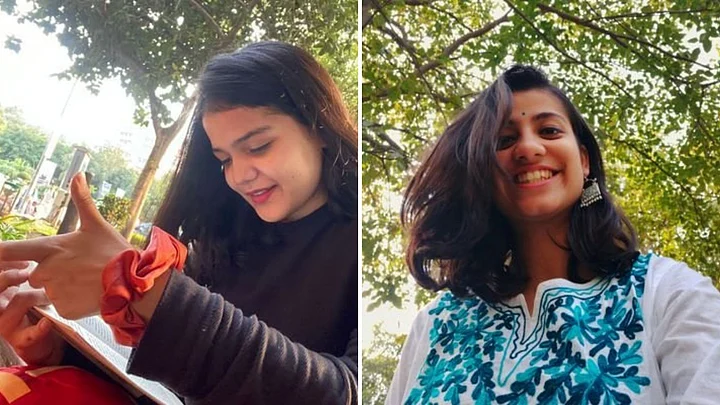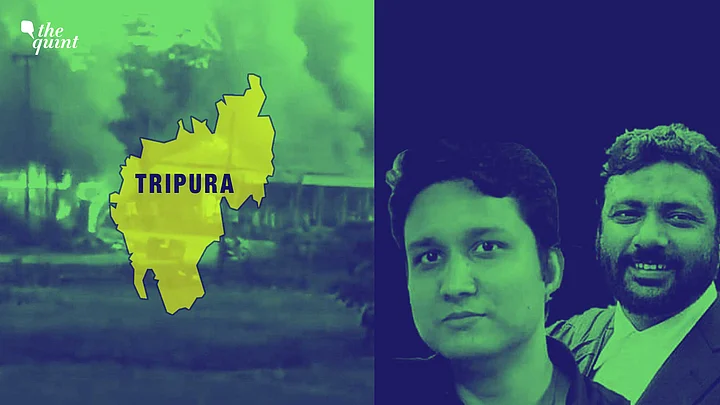Every time a criminal case is slapped against a journalist for being critical of the government or a politician or for just questioning an official narrative, we enter a familiar routine.
There's the shock expressed online, and maybe even at the local press club. The lamentations about freedom of speech. The warnings about chilling effects. The Editors Guild of India issues a statement about the need for a free press.
Then come the articles from legal journalists with comments from experts about how the cases don't make sense. The opeds from the senior advocates and retired judges decrying misuse of the law, the retired police officers shaking their heads about what the police are doing.
After that, or in parallel, the court cases. If there have been arrests, bail proceedings in the lower courts. If no arrests yet, then requests for protection from arrest, the "no coercive action" pleas in the high court, plus the petition to quash the FIR.
Unless they're Siddique Kappan or Kishorechandra Wangkhem or heaven forbid, a Kashmiri journalist, the journalist will generally get protection from arrest or bail.
The quashing petition will take its own sweet time but at least they're not in jail, and so everybody decides to forget about the case.
A few months weeks later, another case, maybe to make it a bit more exciting, the offences slapped on the journalists get an upgrade (even sedition is so passe now, it's the UAPA that's so hot right now).
And the cycle will get repeated. Again. And again. And again.
The Tripura Police's Attempts to Join the Party
The Tripura Police have been waiting for their chance to get in on the free-speech-restricting fun had by their counterparts in Uttar Pradesh, Karnataka, Maharashtra, Chhatisgarh, Uttarakhand, Jammu and Kashmir, Andaman & Nicobar Islands etc etc (we don't have the space to list them all) for a while now.
They tried filing FIRs against a man who put up a Facebook post criticising a BJP missed call campaign and a government servant who put up a Facebook post which made a vaguely political comment about a change in government.
These were put down by then-Chief Justice of the Tripura High Court, Akil Kureshi, back in January 2020.
Then they tried to file an FIR against a CPI(M) leader for saying people should take action themselves to stop those going to house to house to attack people in Badharghat if the police wouldn't do anything. And another FIR against another person from a political party who put up a Facebook post saying 'Finish the end'.
Both these investigations were stayed by Chief Justice Kureshi in June and July 2021.
Luckily for them, Justice Kureshi was transferred to become Chief Justice of the Rajasthan High Court on 9 October 2021 for the remaining few months of his tenure.
And so the Tripura Police were able to happily file new FIRs claiming incitement of hate between communities and even UAPA charges against lawyers who went to perform a fact-finding mission regarding alleged anti-Muslim violence in the state and people who had the audacity to tweet things like 'Tripura is burning'.
But what's a bit of free speech-chilling without a ridiculous case against some journalists? And so on 15 November, they decided to file a case against journalists Samriddhi Sakunia and Swarnaa Jha, who had gone to the state to try and find out what had actually happened there.
Now the Tripura Police say that these cases have been filed because actually no mosques were vandalised in the state as is being alleged, that no violence took place against the Muslims, so all this is malicious fake news.
This would be great if it weren't for the fact that the journalists they've filed the case actually went to a mosque which was vandalised and have tweeted out videos and photos of it for all the world to see, and have spoken to eyewitnesses about what happened.
A local court has already granted bail to Sakunia and Jha, though they have been told to cooperate with the investigation.
It also turns out, that the Tripura Police may be playing clever with language, claiming that only 'prayer halls' may have been attacked, rather than proper mosques, as Ayush Tiwari from Newslaundry has just reported, even though initial FIRs referred to the structures as 'masjids'.
Hold Up a Minute
This is the point in the cycle where we once again publish detailed articles explaining how the police case doesn't make sense, whether by pointing out that there is clear journalistic rather than criminal intent, or that the UAPA cannot possibly be invoked here, or how there has been no disturbance of public order as required to slap on these charges.
But it is perhaps time to stop and say no.
By getting into that cycle, we are agreeing to play a rigged game. We know what we are going to say, we know the police will deflect, we know the courts will eventually ensure interim relief. But at the end of the day, there is never any action against the police or the state government for these pointless cases and so like a game of snakes and ladders with only snakes from 80-100, we keep returning to the same place.
We went through this cycle over the last year with the ridiculous cases against:
Dhaval Patel in Gujarat (sedition, for a report that Vijay Rupani might be replaced as chief minister);
Ismat Ara and Siddarth Varadarajan from The Wire (for a report on the death of farmer Navreet Singh on 26 January which included his father's version of events along with the police version);
Mandeep Punia (for supposedly trying to break through a barricade because he was reporting there);
Supriya Sharma from Scroll (for a report about the conditions of a Dalit woman in a village adopted by Prime Minister Narendra Modi);
Rana Ayyub and others (for sharing a video of a Muslim man from Ghaziabad who claimed he'd been attacked and made to say Jai Shri Ram); and
Kashmiri photojournalist Masrat Zahra (no particular reason).
This is not to say that we should stop pointing out how these cases are flawed, that legal journalists should not be explaining how these cases cannot stand under the law.
The problem is that we are going about this in a way which presumes good faith from the other side. By talking about the letter of the law and Supreme Court precedent, we are assuming that the police forces and governments in question actually care about these things.
But they really don't, do they?
The FIRs are never meant to actually get anywhere, because if they actually did end up in a trial, they would be laughed out of court.
This is why you don't even see chargesheets in these cases, despite the investigations being so limited. This is why you don't even see appeals to the Supreme Court once the relevant high court has granted interim relief, or any attempt to take the case forward once the apex court grants relief.
The only point to these cases is to make the process the punishment and create a chilling effect.
Instead of doing their jobs and questioning those in power, the journalists booked under these FIRs have to now spend time, money and mental energy fighting for bail/anticipatory bail/protection from arrest in the courts. They have to participate in investigations in far-flung parts of the country. They often have to give up their passports and can’t travel.
They now start to think twice before they write anything, with the threat of another FIR a constant sword of Damocles over their heads. Other journalists also start self-censoring to avoid suffering the same fate, whether consciously or sub-consciously.
So What do We do Differently?
The actions of the police are therefore clearly an exercise in bad faith, and there needs to be greater recognition of this at the outset.
We shouldn't be giving them the benefit of the doubt, poring over FIRs and claims and writing in detail how the facts can't fit the standards laid down by the Supreme Court in ABC vs XYZ. We shouldn't be presenting their version and justifications with any degree of seriousness.
What we should be doing is having a presumption of malice, when it comes to cases against journalists. The moment we see a case like this being filed, without even getting into the nitty-gritties, we should be calling these cases out for the oppression they are.
We should be actively disbelieving the police version and their allegations, till such time as there is a finding by a court or the presentation of some irrefutable evidence that indicates there is some wrongdoing.
Now you might argue that this is a dangerous thing to do, as what happens when you have to try and take action against actual hatemongers like Suresh Chavhanke?
This is a fair point to make, but there is an easy solution to this. Before any FIR is registered against a journalist for their work (not for personal social media posts which aren't sharing their work, or private actions), it should have to be screened by a specialist committee appointed by the local high court including senior lawyers and journalists.
There are certainly things which will have to be ironed out with this kind of process, but it can be formulated to make sure that there is a way to stop these bad faith cases against journalists.
Unfortunately, the Supreme Court even while quashing a sedition case against Vinod Dua rejected a similar suggestion for a screening committee for FIRs against journalists earlier this year. However, this wasn't dismissed for being illegal or unconstitutional and so doesn't mean there is no possibility of such a procedure being created by the apex court.
There are currently challenges to the law on sedition and the UAPA where such guidelines and procedures could still be created, at least to ensure that these more serious offences are not thrown willy-nilly at journalists for doing their work.
It would be good to have a process like this even for other IPC offences like Section 153A or Section 505, but at least those offences will not normally mean the person is in danger of being kept in jail, thanks to the Supreme Court's guidelines in the Arnesh Kumar judgment.
It goes without saying that it isn't only journalists who face these kind of Kafka-esque cases, that this has started to become the lot of all dissenters from activists to students.
However, given the importance of the press in highlighting all those other gross abuses of the law, protecting their ability to do their jobs is something that can take a bit of precedence.
In the meanwhile, we will all keep doing our bit in the cycle, from protesting to writing about how these cases are wrong. But it's high time we stopped beating around the bush and letting ourselves be trapped in this rigged game.
(At The Quint, we question everything. Play an active role in shaping our journalism by becoming a member today.)



